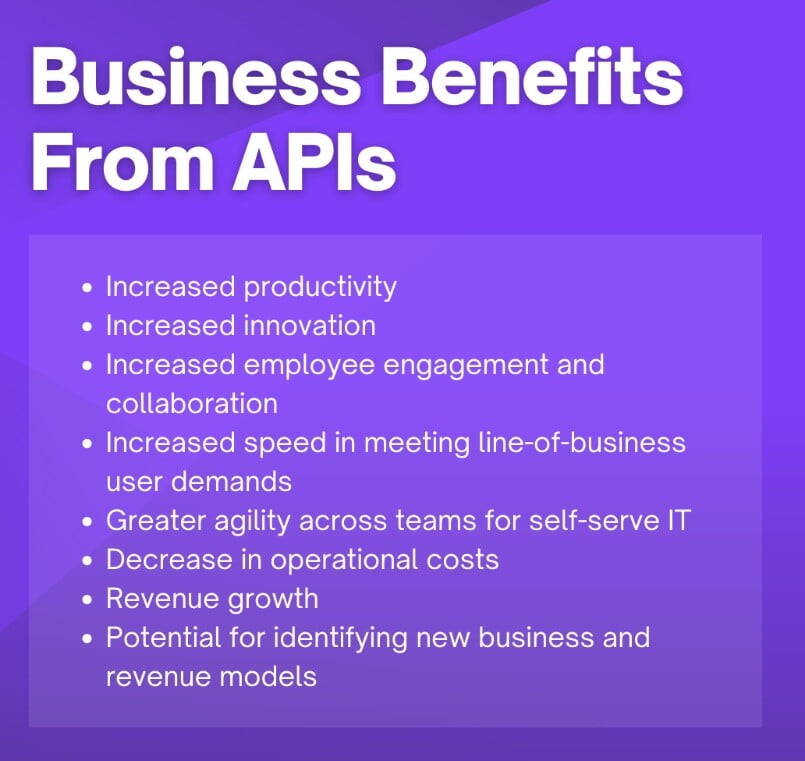APIs, or application program interfaces, are critical tools for companies across the board. APIs are important from a technical standpoint because they allow one computer program’s capabilities to be used by another.
They’re a way for two separate programmers to communicate with each other. APIs allow firms to grow their businesses faster than ever before.
APIs are fostering a new wave of innovation centered on sharing services, similar to how the Web opened up the Internet’s potential. APIs and their ability to alter business processes are attracting the attention of companies across all industries.
What Is API?
APIs (Application Programmer Interfaces) are the connectors that link and communicate data between different programs, platforms, and systems. APIs can automate operations, streamline processes, and give you a consolidated view of your customer’s journey.
Moreover, they make it possible for your legacy technology, third-party SaaS apps, custom business apps, and linked devices to all work together smoothly. This gives you access to data that helps you make better decisions in your company.

APIs’ Importance in a Changing World
The development of revolutionary new business models and evolving customer demands have impacted the rise of APIs, which traditional technologies are ill-equipped to solve quickly and efficiently.
For example, if your company sells event tickets, it might create real ticket booths as well as a website or a first-party mobile app. In many circumstances, tickets are now more of a digital code that an usher scans than a tangible item provided to them.
Similarly, tickets are less frequently purchased in person than online, and relying on a third-party website can be overly limiting.It puts the burden of attracting customers on the company, yet surfacing organically in social media, search engine results, and other digital experiences allows the brand to meet customers where they’re already congregated.
Furthermore, as COVID-19 continues to disrupt events around the world, many ticket sellers—and, for that matter, most organizations—have made the shift to digital-first business relations a must. All of these business model changes, as well as the associated systems and functionality that support them, rely on API connectivity.
Make contact with your customers
An effective API can provide fresh reasons for existing and future customers to interact with a company and connect with it on a personal level — as well as to share their experiences with others.
Consider the hypothetical situation of a nationwide auto insurance provider. It has gathered and maintained extensive, accurate, and up-to-date data on the quality and condition of local roads around the country as part of its usual business operations and planning.
Furthermore, The organisation releases the creativity of developers and connected businesses to find new uses for the data by making previously internal data publicly accessible through an API.
App developers produce apps that suggest driving routes based in part on the condition of the roads. Civic organisations create apps that allow citizens to band together and petition local leaders for increased transit funding. Through web and smartphone apps, the insurance firm provides potential consumers with a way to acquire rate quotations whenever they want and from wherever they are.
Additionally, simply exposing previously isolated and secret data via a public API has provided the insurance company with a powerful means to contact thousands of new clients, who now interact with the company in a more personal and relevant way on a daily basis.
Hence, this API strategy has helped the organisation to boost consumer involvement while also establishing new goods and channels that may be used in ever-more-innovative ways.
Operations Streamline
The insurance firm might also create private APIs for its own workers to utilise — for example, to send information to its sales staff that will enable them provide more accurate estimates more quickly, even when on the road, via web and mobile apps.
Moreover, another API might make it easier for the company’s claims department to access data, allowing them to process client claims faster, more simply, and with fewer errors. These are just a few instances of how a business can increase operational efficiency and customer service by implementing an internal API strategy.
Innovation
The major reason APIs are so important in today’s marketplaces is because they enable speedier innovation.
Change barriers are removed, and more people can contribute to the success of an organisation.
They have two advantages: they allow the company to generate better products while also distinguishing itself from the competitors. APIs also simplify monetization. Companies can sell more ad space if they have a presence on many platforms.
API Success Example
Simply said, APIs enable businesses to enter markets they might not have previously considered. Early adopters may be able to increase revenue by collaborating with other businesses.
There are various companies that have successfully implemented APIs. Uber used the best of those applications and connected them all via APIs rather than establishing its own mapping, payment, or communication services.
Those who remember Twitter’s early days may recall that its user interface wasn’t always user-friendly. TweetDeck, on the other hand, constructed a better user interface on top of the Twitter engine, resulting in a more seamless user experience.
Over and above, thanks to a third-party application, Google Maps was able to display real estate sites on a map, resulting in a massive spike in popularity. Years later, Google Maps and a number of other Google products now have API access.
The Future Of APIs
APIs have the ability to change the way businesses operate. Traditional corporate tactics rely on large sales forces, paperwork, and other time-consuming, archaic, and expensive techniques to run their businesses, and this practise is becoming increasingly unsustainable.
According to Forbes, forward-thinking businesses are cutting costs and saving time by “creating their solutions with best-of-breed components, which they access via APIs.” When considering the Internet of Things, it’s clear that APIs’ significance is expanding beyond tech businesses. APIs can assist organizations in developing effective product strategies for the internet of devices.
Getting Started With APIs
There are a number of reasons why your company might consider developing an API. They have the ability to:
- Boost your revenue
- Extend the reach and value of your customers.
- Assist with sales and marketing efforts
- Encourage business and technical innovation by making backend data and apps easier to integrate.
APIs, in general, allow businesses to scale, stimulate innovation, and reach a larger audience. Moreover, How well a company links to third-party apps, gadgets, and services is becoming increasingly dependent on how well it wins and loses. This is why, regardless of your company’s size or industry, it may be time to learn more about APIs and what they can do for you.
Blog author, Sakshi Baid works as a Product Associate at Refrens.com – Online Invoice Generator
Related posts:








